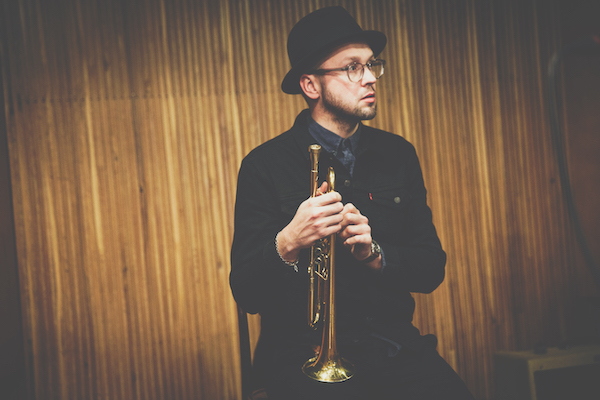Jan 13, 2026 2:09 PM
More Trump-Kennedy Center Cancellations
The fallout from the renaming of the John F. Kennedy Center for the Performing Arts to include President Donald…

Trumpeter Tomasz Dabrowski is a musician eager to challenge himself with shifting contexts and self-imposed limitations.
(Photo: Sisy Cecylia)Adversity has been a steady motivator in the career of Polish trumpeter Tomasz Dabrowski, starting with his early desire to play the saxophone. When he was 13, he signed up for the school band in Rozental, a small village of 800 located 30 miles from Gdansk. But upon learning that all of the saxophone chairs had been filled, he accepted trumpet as an alternative, a decision that ultimately changed his life. He wouldn’t be exposed to jazz for another year or two, hearing some traditional jazz performances at a nearby festival. But he said he already possessed the inquisitiveness to improvise. “I was interested in improvisation since a young age,” he explained. “I guess I always liked doing things my way, and figuring out how to do stuff on my own terms.”
Some 20 years later, Dabrowski is one of Europe’s more versatile and curious players, a musician eager to challenge himself with shifting contexts and self-imposed limitations. Since relocating to Denmark in 2008 to study at Syddansk Musikkonservatorium on Odense—he later moved to Copenhagen, where he still lives, earning a master’s degree at the Rhythmic Music Conservatory—he steadily has initiated new projects and collaborative situations, revealing his range and broad interests.
But it hasn’t been easy. Upon entering high school in Warsaw, Dabrowski was forced to change his embouchure, essentially sidelining him from playing for almost three years. “It was so bad, I remember my lips bleeding one time during a gig,” he recalled. While he achieved success locally, winning a competition (juried by, among others, the saxophonist Zbigniew Namyslowski) that afforded him the opportunity to study in Odense, he still struggled financially and culturally in expensive, privileged Denmark, learning the language and adapting on the fly.
While Dabrowski had a network of collaborators in Warsaw, he had to forge a new circle of partners in Copenhagen. “I started my own groups because nobody asked me to play with them,” he said. “Now, it’s a completely different story, but I definitely had to pay my dues.” Starting with the Tom Trio and eventually disparate quartets like Ocean Fanfare and FREE4ARTS, he forged dynamic combos to interpret different sides of his musical personality. But a key facet of his exploration is to perpetually try new things, such as launching a solo project five years ago—organizing 30 concerts in 30 different cities across 12 European countries, resulting in the aptly named 2016 album 30th Birthday/30 Concerts/30 Cities (Barefoot).
“My nature is to constantly change,” he said. “I simply get bored with too much of one thing, one band, one concept.”
That thinking also led Dabrowski to New York, where he arranged fruitful recording sessions with percussionist Tyshawn Sorey (Steps), and a trio with pianist Kris Davis and drummer Andrew Drury (Vermilion Tree), as well as travels to Japan, where he formed the quartet Ad Hoc. “After all my experiences in the U.S.A., Japan and Europe, I noticed that one-time projects are good to try things out, and to play with incredible players,” he said. “I also noticed the best music comes out if I play with people I trust. So, I started making bands with people who can practice with me, who I feel a connection to, because that takes the music to a whole different level.”
That belief is manifested on two recent recordings. First Nature (Barefoot) by Ocean Fanfare is a richly nuanced, darkly melodic post-bop quartet with alto saxophonist Sven Dam Meinild, bassist Richard Andersson and drummer Peter Bruun, where the smoldering, interactive aesthetic of Dave Douglas’ bands is clear in Dabrowsky’s tensile, creamy tone. When I Come Across (Audio Cave), the second album from his quartet FREE4ARTS with Meinild, guitarist Simon Krebs and drummer Kasper Tom, draws from moody indie-rock in its flinty energy, while maintaining a rigorous improvisational ethic.
Even as he’s focused on these projects, Dabrowski remains dedicated to new things. “Reinventing myself over and over again, that’s what I want—finding new questions, new contexts.” DB

Belá Fleck during an interview with Fredrika Whitfield on CNN.
Jan 13, 2026 2:09 PM
The fallout from the renaming of the John F. Kennedy Center for the Performing Arts to include President Donald…

Peplowski first came to prominence in legacy swing bands, including the final iteration of the Benny Goodman Orchestra, before beginning a solo career in the late 1980s.
Feb 3, 2026 12:10 AM
Ken Peplowski, a clarinetist and tenor saxophonist who straddled the worlds of traditional and modern jazz, died Feb. 2…

The success of Oregon’s first album, 1971’s Music Of Another Present Era, allowed Towner to establish a solo career.
Jan 19, 2026 5:02 PM
Ralph Towner, a guitarist and composer who blended multiple genres, including jazz — and throughout them all remained…

Rico’s Anti-Microbial Instrument Swab
Jan 19, 2026 2:48 PM
With this year’s NAMM Show right around the corner, we can look forward to plenty of new and innovative instruments…

Richie Beirach was particularly renowned for his approach to chromatic harmony, which he used to improvise reharmonizations of originals and standards.
Jan 27, 2026 11:19 AM
Richie Beirach, a pianist and composer who channeled a knowledge of modern classical music into his jazz practice,…